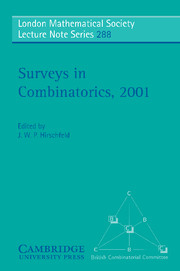Book contents
- Frontmatter
- Dedication
- Contents
- Preface
- Crispin Nash-Williams
- The Penrose polynomial of graphs and matroids
- Some cyclic and 1-rotational designs
- Orthogonal designs and third generation wireless communication
- Computation in permutation groups: counting and randomly sampling orbits
- Graph minors and graphs on surfaces
- Thresholds for colourability and satisfiability in random graphs and boolean formulae
- On the interplay between graphs and matroids
- Ovoids, spreads and m-systems of finite classical polar spaces
- List colourings of graphs
Computation in permutation groups: counting and randomly sampling orbits
Published online by Cambridge University Press: 05 August 2013
- Frontmatter
- Dedication
- Contents
- Preface
- Crispin Nash-Williams
- The Penrose polynomial of graphs and matroids
- Some cyclic and 1-rotational designs
- Orthogonal designs and third generation wireless communication
- Computation in permutation groups: counting and randomly sampling orbits
- Graph minors and graphs on surfaces
- Thresholds for colourability and satisfiability in random graphs and boolean formulae
- On the interplay between graphs and matroids
- Ovoids, spreads and m-systems of finite classical polar spaces
- List colourings of graphs
Summary
Abstract
Let Ω be a finite set and let G be a permutation group acting on Ω. The permutation group G partitions Ω into orbits. This survey focuses on three related computational problems, each of which is defined with respect to a particular input set I. The problems, given an input (Ω, G) ϵ I, are (1) count the orbits (exactly), (2) approximately count the orbits, and (3) choose an orbit uniformly at random. The goal is to quantify the computational difficulty of the problems. In particular, we would like to know for which input sets I the problems are tractable.
Introduction
Let Ω be a finite set and let G be a permutation group acting on Ω. The permutation group G partitions Ω into orbits: Two elements of Ω are in the same orbit if and only if there is a permutation in G which maps one element to the other. This survey focuses on three related computational problems, each of which is defined with respect to a particular input set I:
Given an input (Ω, G) ϵ I, count the orbits.
Given an input (Ω, G) ϵ I, approximately count the orbits.
Given an input (Ω, G) ϵ I, choose an orbit uniformly at random.
The goal is to quantify the computational difficulty of the problems. In particular, we would like to know for which input sets I the problems are tractable.
Many interesting orbit-counting problems come from the setting of “Polya theory”.
Information
- Type
- Chapter
- Information
- Surveys in Combinatorics, 2001 , pp. 109 - 144Publisher: Cambridge University PressPrint publication year: 2001
Accessibility standard: Unknown
Why this information is here
This section outlines the accessibility features of this content - including support for screen readers, full keyboard navigation and high-contrast display options. This may not be relevant for you.Accessibility Information
- 2
- Cited by
